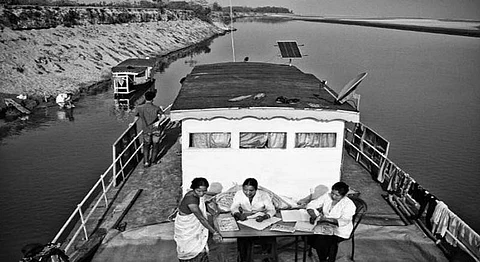
- HOMEGROWN WORLD
- #HGCREATORS
- #HGEXPLORE
- #HGVOICES
- #HGSHOP
- CAREERS
- ABOUT US
- CONTACT US

The mighty Brahmaputra river makes its way from the Himalayas, twisting and turning as it travels through Tibet into the scenic Assam Valley, and forward to Bangladesh before emptying into the Bay of Bengal. One of the major rivers of the continent, along with its tributaries, the Brahmaputra is also known to be very temperamental.
It creates incredibly fertile lands for a number of small river islands that are interspersed along its path, but it’s equally destructive, eating up huge chunks of land with devastating floods and increasing soil erosion that leaves many islanders displaced and disconnected from major facilities and resources such as education, modes of communicating with the mainland, sufficient food and medical facilities.
The Centre for Northeast Studies and Policy Research (C-NES) launched an initiative in 2005 to try and overcome the problem of poor health care that island dwellers are exposed to, more so during the monsoon when floods and diseases run rampant.
Starting with a single boat, Ankha, meaning hope, in the Dibrugarh district, boat clinics carry essential medical supplies and services to the people in these cut-off areas.
Following the idea “if they cannot come, the hospital can come to them,” these boat clinics serve as a ray of hope that provides doctors, nurses, medicines and even a laboratory; all health related complaints of the islanders are tended to, but it wasn’t always easy.
"Initially when the boat clinic used to come, there was curiosity, but we didn't have much faith in it. Most of the elders opined that it was a temporary thing and wouldn't do us any good," recalls Amiya Begum to ANI News. "But they kept returning, with medicines, and people who went to them were treated of their problems.
Slowly our confidence grew, and now whenever the boat clinic comes we rush to be ahead in the long queue.” There was suspicion and hesitation, more so when it came to getting pregnant women checked my male doctors as well "but when we saw the doctors' and the nurses' dedication, the way they explained things to us, that veil too lifted," said Shama, a friend of Amiya’s.
She adds: “over and above, now we are being regularly checked, treated of our ailments, and given free medicines, without having to pay Rs.10 one way for a boat ride to the mainland hospital. We are poor people and most of the times, unless it's an emergency, we avoid going to the hospital altogether.”
With the added support of the National Rural Health Mission (NRHM), there are now fifteen such ‘boats of hope’ that reach up to thirteen districts across Assam providing necessary health care to close to half a million people.
Health camps are organised with the arrival of the boat clinic, word about the camp is spread by workers of the Accredited Social Health Activist (ASHA), a key component in the NRHM. Doctors conduct general check-ups at the camp, and if need be, they even refer patients to specialists on the mainland.
Their main focus though is on maternal and child health, and according to on-board staff members the visits are usually timed in sync with immunisation dates. Assam has one of the highest maternal mortality rates (MMR) and infant mortality rates (IMR) in the country. According to a study by the National Health Mission, the IMR and MMR in the state is higher than the nation’s average, and with the increasing flood devastation and consequent spread of waterborne diseases, it’s only likely to worsen.
13,316 health camps have been organised since 2008, according to NRHM, providing approximately 60,000 women with antenatal care, 15,700 with postnatal care, and 123,350 children with routine immunisation, as well as addressing other medical needs, such as malnutrition.
Apart from the doctors and nurses at the camp, ASHA workers even go door to door raising awareness about proper hygiene and need for immunisation, and in cases of emergency they’ve even assisted in childbirth.
"Communication is difficult in the saporis, and many times because of an emergency, a woman cannot go to the hospital for delivery. In such cases we have assisted in childbirth," said Riturekha Baruah of C-NES, who oversees the boat clinic programme in the Jorhat district.
Encouraging family planning in an area with high levels of illiteracy and several superstitious beliefs is a difficult task for the clinic workers who have to go change people’s attitudes to remove the misconceptions regarding several cultural practices.
The volatile river poses several challenges for the boat clinic as getting to the islands very often becomes difficult, in both the dry season and monsoons, where on one hand the water levels are too low for the boats — it has to be at least four feet for the motor boat to function--whereas on the other hand, boats have gotten truck in thunderstorms and floods.
Yet through these trials and tribulations, the boats remain a vital link for the islanders to mainland facilities, a lifeline for the villages bringing medicines and much-needed information, and more importantly, a sense of hope for people living in dire circumstances.
Feature image courtesy Arkaadripta Chakraborty via DNA
